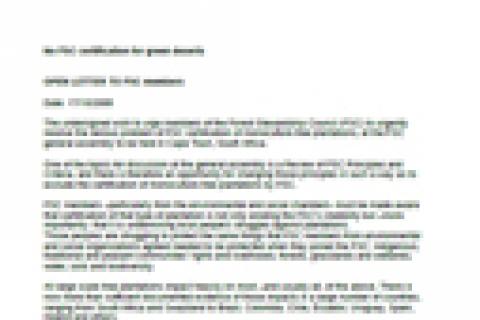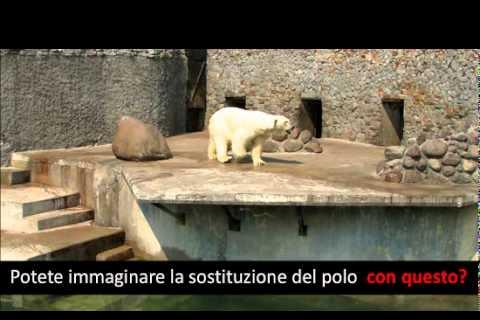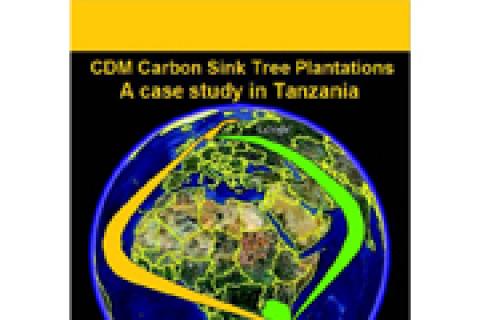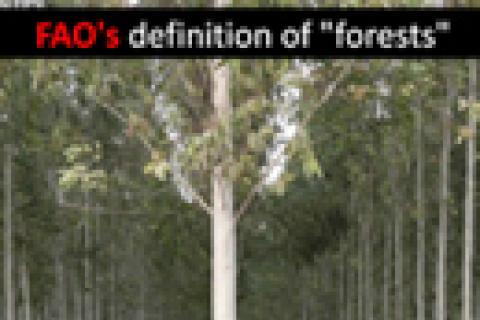Only available in Spanish -
Por Guadalupe Rodríguez, Salva la Selva
El precio del oro está en alza por décimo año consecutivo, dado que inversores, operadores y bancos centrales lo han buscado como refugio seguro. Se espera que se mantenga esta tendencia. La posesión de oro da seguridad frente a la situación inestable de la economía global, por lo que todos desean el codiciado metal. Y esto tiene consecuencias.
Download full document here
Other information
We are pleased to announce that we have received a number of translations of the short video we produced to graphically illustrate the mistaken view behind FAO’s definition of forests.
By Blessing Karumbidza and Wally Menne - The Timberwatch Coalition
This study dissects a tree plantation carbon sink project at Idete in the Southern Highlands of Tanzania.
The Norwegian company that owns the project, Green Resources Ltd, aims to register the project under the CDM (Clean Development Mechanism) so as to be able to generate carbon credits to sell to the Norwegian government.
This year has been declared the International Year of Forests by the United Nations. In response, WRM has initiated a campaign that challenges the definition of “forest” used by FAO. Among other activities, we have drafted the following letter, for which we are seeking signatures from scientists and professionals in different fields related to the study of nature. The letter will be presented to FAO this coming September 21, the International Day Against Monoculture Tree Plantations.
What the big forestry companies have done with our territories in Chile is so devastating, so sad and so irreversible that it brings to the mind the “shock doctrine” described by Canadian author and activist Naomi Klein in her book of the same name (1).
When Kenyan Nobel Peace Laureate Wangari Maathai launched in 1977 the Green Belt Movement – promoting the planting of indigenous trees in forest catchment areas and riparian reserves, private farms with high community access, and public spaces to preserve local biological diversity – she was wary that that the introduction of exotic plant species can have a severe effect on the balance of the ecosystem.
The High Court in Kuching, the capital city of the East Malaysian state of Sarawak in the island of Borneo, has made a landmark decision when it ruled out on last 20 February that any joint venture agreement between a non-native and native in oil palm plantation is in contravention of the Land Code that provides that ‘a person who is not a native of Sarawak may not acquire any rights or privileges whatever over native customary right”.
Montes del Plata is the name of the joint venture created for operations in Uruguay by two forestry, pulp and paper transnationals: Arauco of Chile and the Swedish-Finnish company Stora Enso. The two have joined forces to build and operate a pulp mill that will produce at least 1.45 million tons of pulp annually.
As a result of this merger, the Montes del Plata consortium became the largest landowner in the country. It controls 250,000 hectares of land devoted to monoculture tree plantations, which will provide the raw material needed by its mega-pulp mill.
For a number of years, peasant farmer communities in the province of Niassa, in northern Mozambique, have been fighting back against the expansion of monoculture pine and eucalyptus plantations. This expansion has caused serious problems because it is taking over land from machambas, small family farms used to grow food. Now the struggle waged by these communities has received a significant boost.
Brazil: Women in Camp Sister Dorothy Stang – for their right to life, against monoculture eucalyptus
On the evening and early morning of 27 th and 28th February, women of the Landless Rural Workers Movement from all over the Extreme South of Bahia gathered in the area that would become the Camp Sister Dorothy Stang. Many brought their children and looked like they were going to the best party in the world. On 28 th March, round about 4am, before the sun rose on the horizon, hundreds of useless eucalyptus trees were falling on an area planted by Veracel Cellulose, the largest land owner in the state of Bahia. And that’s how they resisted for the next 10 days.
Powerful countries and corporations have targeted the African continent to become a commodity supplier for their industrial needs. This has led to intense land grabbing with industrial oil palm plantations becoming in recent years a new source of land grabbing in many African countries.
On April 20, the Finnish-Swedish giant of the forestry industry Stora Enso held their annual shareholder meeting in Helsinki where it planned to distribute part of its 2010 EUR 817.4 million profit.




